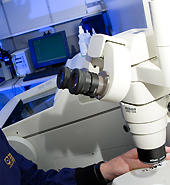J. Matthews, MD: Pap Test Explained

Muskogee, OK
If you were asked to conjure up one phrase to represent what gynecologists do with their time day in and day out, what could you come up with? If you’re like most of my patients, you would immediately reply “Pap smear.”
How many of you, though, could explain just what a Pap smear consists of, or what its purpose is? This just isn’t a topic that often gets tossed around at casual lunches or over coffee.
The Pap smear is a medical test which is actually one of the most effective cancer-screening methods ever devised. It’s done by removing some cells from the surface of the cervix with a plastic “spatula” or brush. These cells are then sent to a pathologist, a doctor who specializes in microscopic examinations of tissue.
What the pathologist looks for are changes in the cells that are abnormal, changes that are referred to as dysplasia, which is significant because it can signal the first steps in a transformation to cervical cancer. That is what makes this test so useful: it detects changes in cells before cancer has begun.
Many women, when contacted by a doctor about an abnormal Pap smear, incorrectly conclude that they already have cervical cancer. Fortunately, this is very rarely the case. Cervical cancer tends to develop very slowly, and so women who have annual Pap smears can find precancerous changes early and get treatment before cancer strikes.
The Pap smear has been around for many decades, and for most of that time it has been our best weapon against the fifth most deadly women’s cancer worldwide. The incidence of invasive cervical cancer has dropped more than 50 percent since Pap smears began to be widely used.
In just the last few years, though, two new weapons have appeared which may eventually make the Pap smear obsolete. That doesn’t mean that your gynecologist can start throwing away all of those speculums, but we may be able to drive the number of deaths from cervical cancer even lower than it already is.
Doctors now know that cervical cancer is almost exclusively caused by a virus, called the human papilloma virus: HPV for short. This fact makes it fairly unique among cancers. Unlike breast cancer, ovarian cancer, colon cancer, or almost any other cancer, cervical cancer could potentially be defeated.
In the meantime, you should be checking your memory for the date of your last encounter with that speculum. If it’s been more than a year, give your doctor a call.
Labels: Cervical Cancer Awareness, Cervical Cancer Screening, Pap Smear, Pap Smear Test

0 Comments:
Post a Comment
<< Home